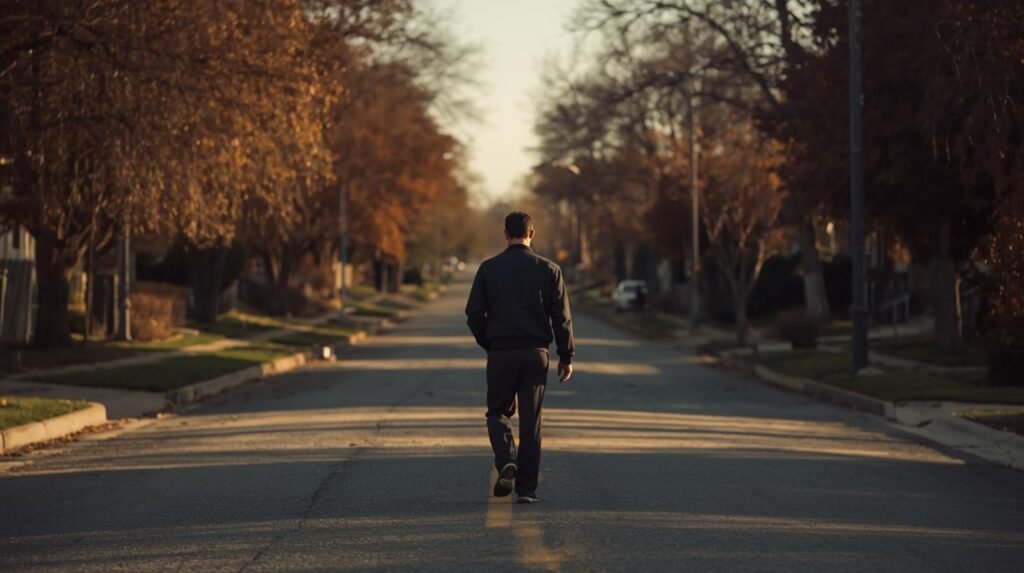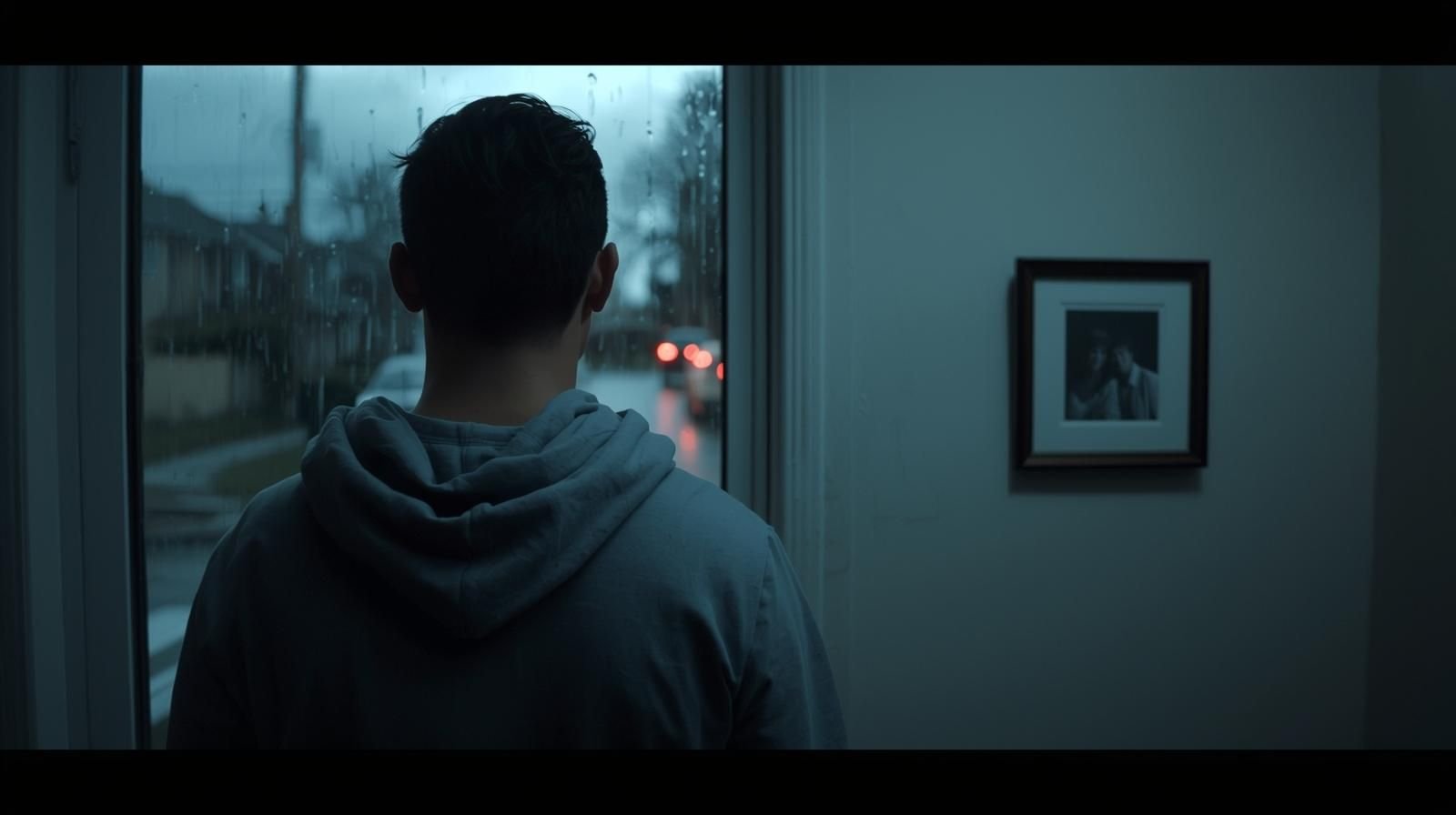You know, sometimes I get lost down these true crime rabbit holes. I’ll read about a case, and my mind always snags on one particular detail. It’s never the gory stuff that sticks with me the longest. It’s the aftermath. It’s the question of what happens to the people left behind, the ones who had no part in the horror but are forever tied to it.
I’ve been thinking a lot about that lately, especially about a man named Brian Rader. You might not know that name, but you almost certainly know his father’s: Dennis Rader, the BTK Killer. While his father became a monster of true crime infamy, Brian’s life has been a quiet, decades-long lesson in carrying a pain he didn’t choose. This isn’t a story about a killer. It’s a story about a son, and the incredible strength it takes to build a quiet life under the weight of a terrible name.
The “Before Times”: A Family Picture That Was All Wrong
Before everything shattered, the Rader family photo looked… well, normal. And that’s the part that’s just so hard to get your head around.
The Guy Next Door
If you were to imagine a serial killer, you probably wouldn’t picture Dennis Rader. And that was his greatest trick. In Park City, Kansas, he was just… a dad. He was the guy who went to work, mowed his lawn, and served as a Cub Scout leader. His son, Brian Rader, and his daughter, Kerri, grew up in that house. They ate dinner with him. He probably helped them with homework. It’s the terrifying truth that monsters don’t live under the bed; sometimes, they sit at the head of the table, wearing a perfectly ordinary face.
A Double Life in Plain Sight
For over thirty years, Dennis Rader was the BTK Killer—Bind, Torture, Kill. He terrorized Wichita, taking ten lives and taunting the police with letters. He was this phantom of pure evil the whole city was afraid of. And then he’d go home, take off the mask, and be “Dad.” The sheer amount of lies it took to keep that up is just staggering. For Brian Rader, his entire childhood was a performance he didn’t know he was watching. The foundation of his life was built on something rotten, and he had no idea.
The Day the World Fell Apart
Every family has its stories, but for the Raders, February 25, 2005, is the day the earth opened up.
The Floppy Disk That Solved Everything
BTK had been quiet for years. He was a ghost story. Then, he started sending letters again. And get this—he got cocky. He sent the police a floppy disk (remember those?) and actually asked if they could trace it. Spoiler alert: they could. That little piece of plastic led them right to his church and then to his front door. All that control, all that cunning, undone by his own arrogance and some outdated tech. Ironic, isn’t it?
When “Dad” Vanished
Can you even imagine? The knock on the door. The swarm of police cars. The slow, then sudden, horrifying realization dawning on Brian Rader and his family. The man they loved, the man they called Dad, was a stranger. He was a murderer. In one single moment, every memory, every Christmas morning, every fishing trip—it was all poisoned. Their past was rewritten with a terrifying new truth. How do you even start to process that? Your whole life, your whole history, becomes a lie.
The Kind of Pain You Can’t Explain
The pain Brian Rader carries is a special kind of hell. It’s not the pain of something you did. It’s the pain of something you are—or rather, who you’re related to.
A Burden You Can’t Put Down
This is the core of it. He didn’t do anything wrong. He was just born into the wrong family. The shame, the global curiosity, the sideways glances if people recognize his name… it’s all a burden placed on his shoulders through zero fault of his own. How do you grieve for a father who is not only gone but revealed to be a monster? It’s a messy, awful, and deeply lonely kind of grief.
Living in a Fishbowl of Someone Else’s Making
And it’s not just a private pain. It’s public.
- The Inside Stuff: This is the personal wreckage. The betrayal. The fear about what’s in your own bloodline. The struggle to trust your own memories.
- The Outside Noise: This is the world that won’t let it go. Every new documentary, every podcast episode, every online comment is a fresh reminder. He can’t escape because the world is forever fascinated by the monster his father was.
That’s a life sentence of having to manage your own emotions while the world watches.
Choosing to Disappear: The Power of Staying Silent
So, what do you do? In today’s world, the easy way out might seem to be going on a podcast, cashing in, telling your side of the story. But Brian Rader did the complete opposite, and honestly, I find it so powerful.
The Loudest Sound is Silence
Since that day in 2005, Brian Rader has essentially vanished. No interviews. No statements. No “exclusive sit-downs.” His silence isn’t empty; it’s full of meaning. It’s a wall he’s built to protect himself and his own family. In a world that’s always screaming for more, his refusal to say a single word is his way of saying, “My life is not your business.”
Building a Quiet Life
From the little bits we know, it seems Brian Rader has done the hardest work of all: he’s built a normal life. He’s believed to be married with kids, working a regular job, just trying to be a good dad and husband. Let’s be honest, that’s the ultimate “screw you” to his father’s legacy. He’s actively choosing to be the opposite of Dennis Rader: present, stable, and quiet. He’s redefining the Rader name one boring, beautiful day at a time.
Also read: Denise Shillue: The Inspiring Story Behind Success
How Do You Even Cope? A Peek at Survival
We can’t know his personal playbook, but his actions show us a path. It’s not flashy, but it looks like resilience.
| How He Probably Copes | What It Looks Like in Real Life | Why It’s So Smart |
|---|---|---|
| Accepting the Unchangeable | Acknowledging “This is my reality, I can’t wish it away.” | Stops you from wasting energy fighting a past you can’t change. |
| Building Fortress-Level Boundaries | No media. Private social media. Being super picky about who you let in. | Protects your peace from the constant public noise and curiosity. |
| Leaning into the “Boring” | Focusing on the day-to-day: work, family, routines. | Creates a stable, sane present to counter the chaotic past. |
| Getting Professional Help | (We can assume) Talking to a therapist who gets complex trauma. | You can’t carry this alone. A pro gives you the tools to handle it. |
| Writing a New Story | Being a good dad and a decent person, on his own terms. | It’s the ultimate way to reclaim his name and his life. |

What Brian Rader’s Story Teaches the Rest of Us
You don’t need a serial killer for a father to learn from Brian Rader’s life. His choices are a masterclass for anyone trying to overcome a painful past.
You Are Not Your Parents
This is the big one. Your family’s worst moment does not have to be your destiny. Brian Rader is living proof. He had no say in who his father was, but he has total control over the man he is. Your past might be your first chapter, but you’re the one who writes the rest of the book.
Let’s get real for a second: Maybe your struggle is with a family history of addiction, abuse, or just a lot of drama. The goal isn’t to pretend it didn’t happen. It’s to look at it, learn from it, and make a conscious choice to do things differently. To break the cycle. That’s what Brian is doing, every single day.
It’s Okay to Build Walls
We’re always told to be open and share our stories. But sometimes, the bravest, healthiest thing you can do is to say, “This part of me is off-limits.” Protecting your peace is not a weakness. It’s a necessity.
Normalcy is Underrated
After a trauma, chasing a dramatic, exciting life might seem tempting. But often, the real healing is in the mundane. The school runs. The grocery shopping. The quiet evenings. Building a simple, predictable life is a powerful way to tell yourself that the chaos is over. You are safe now.
Conclusion
At the end of the day, the story of Brian Rader sticks with me because it’s so quiet. In our loud, oversharing world, his silence is profound. It’s not a story of fame or scandal, but of a man who tends to his healing in private, who chose to build a good life in the shadow of a terrible one.
His journey reminds us that some burdens are too heavy to explain, and that’s okay. It shows us that resilience isn’t always about a triumphant comeback. Sometimes, it’s just about the quiet, daily courage to live a simple, decent life, no matter what you’re carrying. And I think that’s a kind of strength we can all learn from.
FAQs
1. Wait, who is Brian Rader again?
He’s the son of Dennis Rader, the infamous BTK serial killer from Kansas. He’s spent his adult life staying out of the spotlight.
2. What does he do for work?
It seems he’s worked regular jobs, often in trades, and has focused on keeping a stable, private life for himself and his family.
3. Has he ever talked about his dad?
Nope. Not a word. He’s never given an interview or made a public statement. His silence is a key part of his story.
4. How could anyone deal with that?
While we don’t know for sure, it looks like he’s done it by creating strong boundaries, focusing on his own family, and seeking privacy above all else. It probably also involves a good therapist.
5. Where is he now?
He’s living a private life somewhere, and honestly, I think we should respect that. He’s earned his anonymity.
Thanks for visit Techywil











